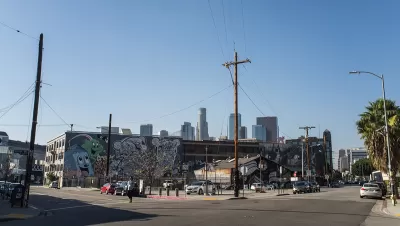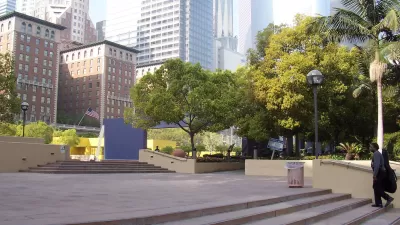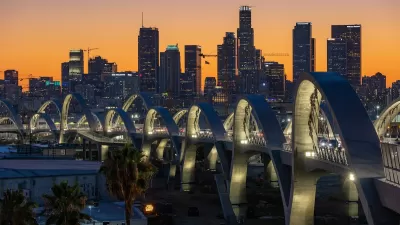Downtown L.A.'s Arts District transformed from an industrial sector to a vibrant, mixed-use neighborhood. Now, the community's attempts to protect their vision from haphazard development illuminate Los Angeles's broken planning process.

In a thoughtful interview with developer Yuval Bar-Zemer, The Planning Report reviews the conditions that made it possible for L.A.'s unique Arts District to flourish, and the community's struggle with the city to keep those conditions intact.
Bar-Zemer has lived in the district since the early 2000s, and pioneered a live/work development model to promote the environment he wanted for his family. It helped that industrial zoning protected the area's attractive older buildings from being replaced by new construction, and a city ordinance allowed artists to take over formerly industrial buildings.
When the artsy neighborhood's success began to attract outside investors seeking to relax development restrictions, the Planning Department approached the community to create an ordinance that would meet the area's needs.
But the result was a draft that failed to address the community's most important concerns about new development. And when residents pushed back, the Planning Department appeared to suddenly scrap the entire plan in favor of a citywide rezoning process. Bar-Zemer notes:
"Making the plan citywide actually shrunk the voice of the community within the overall context. A citywide ordinance does not need to listen to a community of 2,500 people in the same way that an ordinance precisely for those 2,500 people would need to."
Though the outreach process had felt inclusive, in reality, "[it] hadn't been transparent," Bar-Zemer says.
"It wasn't a lot of opinions sitting around one table and deliberating. Each group gave an opinion separately, and the Planning Department picked up the various opinions, mixed them up, and came up with a product." (New planning director Vince Bertoni made a similar diagnosis.)
As competing ballot initiatives and the mayor all vie to write the future of planning in LA, Bar-Zemer reflects on how political the process has become, and the damage that has already been done:
"We have a missed opportunity… to invent a new model for an urban place where people can live and work in the same place and use a bicycle to get around. How many places do we have like that in LA?"
FULL STORY: Yuval Bar-Zemer: Reimagining LA’s Arts District & The Proper Role of Community Plans

Alabama: Trump Terminates Settlements for Black Communities Harmed By Raw Sewage
Trump deemed the landmark civil rights agreement “illegal DEI and environmental justice policy.”

Planetizen Federal Action Tracker
A weekly monitor of how Trump’s orders and actions are impacting planners and planning in America.

Why Should We Subsidize Public Transportation?
Many public transit agencies face financial stress due to rising costs, declining fare revenue, and declining subsidies. Transit advocates must provide a strong business case for increasing public transit funding.

Understanding Road Diets
An explainer from Momentum highlights the advantages of reducing vehicle lanes in favor of more bike, transit, and pedestrian infrastructure.

New California Law Regulates Warehouse Pollution
A new law tightens building and emissions regulations for large distribution warehouses to mitigate air pollution and traffic in surrounding communities.

Phoenix Announces Opening Date for Light Rail Extension
The South Central extension will connect South Phoenix to downtown and other major hubs starting on June 7.
Urban Design for Planners 1: Software Tools
This six-course series explores essential urban design concepts using open source software and equips planners with the tools they need to participate fully in the urban design process.
Planning for Universal Design
Learn the tools for implementing Universal Design in planning regulations.
Caltrans
Smith Gee Studio
Institute for Housing and Urban Development Studies (IHS)
City of Grandview
Harvard GSD Executive Education
Toledo-Lucas County Plan Commissions
Salt Lake City
NYU Wagner Graduate School of Public Service




























